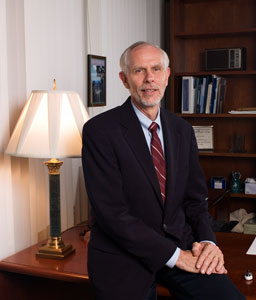  |
| HOME | THIS ISSUE | CALENDAR | GRANTS | BACK ISSUES | < BACK | NEXT > |
Anderson to head research, graduate education by Richard Veilleux - September 5, 2006
|
||||
| Gregory Anderson, who headed the Department of Ecology and Evolutionary Biology for 15 years, has been appointed to a two-year term as vice provost for research and graduate education and dean of the graduate school.
Anderson had been serving as interim vice provost since September 2005, when Janet Greger stepped down. University officials hoped to hire a new vice president and dean within a year, but the search was called off when it became clear that it should first be determined whether the position should be kept as is, or the two jobs - research vice president and dean - should be split. "I very much welcome the opportunity," says Anderson. "What I enjoy most about it is being able to work with the entire University. As a department head, I concentrated on my single unit, but in this role, I have the opportunity to work with fine arts, engineering, agriculture, even law, medicine, and dental medicine. I enjoy working with people, and this job allows me to do that at the University level." Anderson says he sees the post as having three roles: facilitating and promoting research, fostering compliance and maintaining University standards, and providing services for graduate programs. He says his role in research is to work with Provost Peter Nicholls and the academic deans to facilitate research, and to identify and help find support for the strongest programs (with many definitions of 'strongest'). "That doesn't mean other research projects go away," he says, "but with limited budgets, we can't do everything at the highest level. We have to be able to tell the University where we're strongest, and where we should focus." He says compliance also is a major issue for the University. To that end, peer-staffed compliance bodies, such as the Institutional Review Board, have been working with researchers across campus to discuss compliance - including ethics - trying to make the programs as transparent and flexible as possible. "We protect the University by protecting the faculty," he says, "ensuring they're doing everything they can to stay out of the crosshairs of regulatory agencies." As for the Graduate School, Anderson says staff work with graduate programs on admissions and records. "More importantly, the Graduate School works with the programs to promote diversity, to identify fellowship programs or multidisciplinary opportunities, and to identify best practices - what works, what doesn't, based on the experience of our colleagues in graduate programs around the country." Anderson says there are many fine graduate programs at UConn, and overall, the University's graduate reputation continues to grow stronger in a number of areas. One good indication of that is the statistic this year on yield, he says: more than 85 percent of the students offered admission to the various graduate programs this year accepted. "We have a number of outstanding programs," he says. "We are identifying and recruiting great students, and we're getting them because they know they will have excellent programs in which to develop professionally." |
| ADVANCE HOME UCONN HOME |

